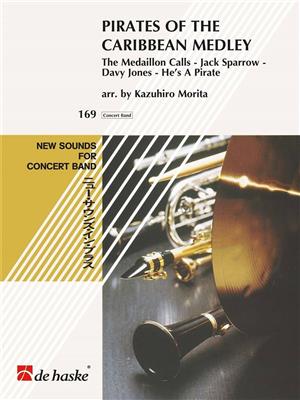Results
-
 £134.99
£134.99Coldplay in Symphony
Bert Appermont is mostly known for his original works for band. With 'Coldplay in Symphony' he has combined his cinematic, orchestral style of writing with the melodic genius of some of Coldplay's greatest hits: 'Viva La Vida', 'Sky Full of Stars', 'Clocks' and 'The Scientist'. Coldplay, with a symphonic twist!
Estimated dispatch 7-14 working days
-
 £137.99
£137.99Queen Symphonic Highlights
The British rock band Queen, formed in 1970, are one of the most popular bands of all time. The music of Queen already exists in numerous instrumental arrangements at all kinds of levels. However, arranger Philip Sparke has taken a unique approach: he has created an exceptional medley in a challenging, symphonic style from four of their greatest hits: 'Bohemian Rhapsody', 'Bicycle Race', 'Who Wants to Live Forever' and 'We Are the Champions'.
Estimated dispatch 7-14 working days
-
 £104.99
£104.99Pirates of the Caribbean Medley 1 and 2
The Pirates of the Caribbean Medley is a fun medley featuring the most popular melodies from the first two Pirates of the Caribbean films. Songs include: The Medallion Calls and He's a Pirate from The Curse of the Black Pearl and Jack Sparrow and Davy Jones from Dead Man's Chest. Ideal for concert performance, take your audience on this exciting pirate adventure!
Estimated dispatch 7-14 working days
-
 £169.99
£169.99Leonardo - Otto M. Schwarz
Leonardo by Otto M. Schwarz is an 11-minute work for Concert Band based on the life and work of Leonardo da Vinci.Born in Italy in 1452, da Vinci was a polymath of the Renaissance period whose interests included astronomy, philosophy, science and mathematics as well as the visual arts. He is considered one of the greatest painters of all time - who does not know of his famous 'Mona Lisa' or 'The Last Supper'?Inspired by da Vinci's notebooks, or codices, this composition takes the listener on a journey through the artist's incredible career. Through his music, Schwarz brings da Vinci back to life. The listener will beable to sense the passion, and the urge for innovation that set da Vinci apart as one of the most remarkable thinkers of the 16th century.This set includes a score and parts.
Estimated dispatch 7-14 working days
-
 £57.50
£57.50One Small Step - Michael Oare
In July 1969, Apollo 11 completed its mission to the moon and Neil Armstrong made his famous proclamation 'That's one small step...' as he stepped out onto the lunar surface. Michael Oare's descriptive work for young bands captures the drama of that moment and offers the option of using actual audio clips from the mission for a truly magical effect.
Estimated dispatch 7-14 working days
-
 £159.99
£159.99Tarjan - Thierry Deleruyelle
Tarjan, Hungarian Pictures is a work in three movements commissioned by the town of Vesoul and its concert band. This work pays tribute to Jean-Marie Goux, the band's former musical director, who had forged strong links with Hungary: whether in the village of Tarjn or Budapest itself, he had shared his zest for life with the Hungarian people. This colourful work consists of three movements: 'The 7th Tribe', 'Eternal Fidelty' and 'Conquest of the Homeland'. It offers not only strong musical content, but also historical insight about a beautiful region with a great tradition.
Estimated dispatch 7-14 working days
-
 £94.99
£94.99Inspire! - Satoshi Yagisawa
Composer Satoshi Yagisawa is very popular in Asia, and has a great reputation in Singapore in particular. He composed this piece in 2017 as a commission from the Yishun Primary School Concert Band. The title Inspire! comes from the initials of the classroom names at the school: Independence, Nation-Loving, Sincerity, Perseverance, Integrity, Respect and Excellence. The piece is imbued with positivity and belief in the future for the young generations to come.
Estimated dispatch 7-14 working days
-
 £115.60
£115.60The Boys are Back in Town - Phil Lynott
The Boys Are Back in Town is a single from Irish hard rock band Thin Lizzy. The song was originally released in 1976 on their album Jailbreak. Both the single and record album are regarded as the bands most successful both commersial and musically. The songwriter Phil Lynott (1949-1986) was vocalist and bassist in the band. He has composed most of the greatest songs of Thin Lizzy.
Estimated dispatch 7-14 working days
-
 £174.10
£174.10Do Dat Thing - Harry Connick Jr.
Harry Connick Jr. is an American pianist, singer, composer and actor from New Orleans. He has released many albums and perform frequently with his own big band. "Do Dat Thing" is a real "feel-good" song composed in New Orleans style. The tempo must not be too fast. A kind of rough, heavy groove is preferred. When staccato is notated, the 8th notes have to be straight. The notations in the Drums-part is optional. From 35, the rhythm in the bass-line is meant as information for the musician. Be aware of the dynamics from the beginning (not too loud) to give it a "lift" at the end of the piece.
Estimated dispatch 7-14 working days
-
 £154.60
£154.60Gallito - Pasodoble Torero - Santiago Lope
Santiago Lope was born in Ezcaray (La Rioja, Spain) on May 23. 1871. He studied violin and composition at the Royal Academy of Music in Madrid. When the city of Valencia organized a municipal band in 1902, Lope was a leading figure. The four pasodobles: Dauder, Gallito, Angelillo and Vito are all dedicated to the star matadors of the time. Gallito is the most performed of the four, and is dedicated to Fernando Gmez Ojeda. Santiago Lope died on September 25. 1906.
Estimated dispatch 7-14 working days
